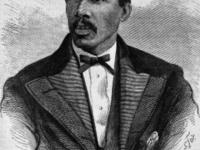Pythian founder and team member Octavius V. Catto was a competitor both on and off the baseball field. He worked tirelessly in the years following the Civil War to break down racial barriers and to push for increased social and political rights for Philadelphia’s black community. For Catto and his fellow Pythian teammates, baseball was more than just a game; it was yet another playing field upon which African Americans could challenge and compete for equal participation and recognition. Catto’s Pythian ball club represented Philadelphia’s best and brightest and publicly demonstrated the talent, competitiveness, determination, and solidarity within the black community. This activity examines the formation of the Pythian club and explores the role that baseball played in the postbellum period. Students investigate the ways in which baseball built community ties, pushed racial boundaries, and established local and national networks of support. The primary-source material in this lesson also allows students to explore the difference of opinion among Philadelphia’s black leadership regarding the strategies employed to bring about social change and promote advancement within their community.
Pythian's Base Ball Club: Playing for Keeps
Pythian's Base Ball Club: Playing for Keeps
Essential Questions
Objectives
- Students will develop critical thinking skills by interpreting primary-source materials.
- Students will understand points of view and perspective in relation to historical events and individuals.
- Students will evaluate conflict and cooperation among racial groups in Philadelphia in the post-Civil War era.
- Students will apply their understanding perspective through a written role-playing assignment
Primary Sources
Other Materials
Worksheets
The Pythian Base Ball Club's 1867 request for admittance into the PAABP
William Still's and Jacob C. White's Letters
Pennsylvania Legacies
"Octavius Catto and the Pythians of Philadelphia," by Jerrold Casway, Pennsylvania Legacies, Vol. 7, No. 1, May 2007
Suggested Instructional Procedures
1. Ask students to brainstorm major concerns of the black community immediately following the Civil War. Responses may include protecting freedom, acquiring legal rights such as voting or citizenship, finding employment, resettling, uniting with families, and obtaining an education. Discuss the 13th, 14th, and 15th amendments. You can find use the National Constitution Center’s Interactive Constitution to do this.
2. Introduce the Pythian baseball team organized by two African American intellectuals and community leaders, Jacob C. White Jr. and Octavius Catto. Have students assess whether they would consider the formation of a black baseball team to be an important focus in the postbellum period. Draw upon the Legacies article to review the history of the team. Identify White and Catto as black leaders in the postbellum period and briefly discuss their involvement in Philadelphia’s black social and political organizations.
3. Distribute William Still’s letter to the Pythians, Jacob C. White’s response, and the document worksheet. Identify Still as an abolitionist who was actively involved in the Underground Railroad in Philadelphia during the antebellum period. Compare the ages of Still (1821–1902), Catto (1839–1871), and White (1837–1902) and have students consider how the antebellum experiences of these individuals might have shaped their activism and strategies following the Civil War.
4. Review the document worksheet responses. Discuss the tone and perspective of the two letters. Review the list of needs the students brainstormed at the start of class and assess William Still’s criticism of the Pythians.
5. Distribute the 1867 Pythian Base Ball Club report and the student worksheet. As a class, discuss the significance of the Pythian’s request for admittance into the Pennsylvania Association of Amateur Base Ball Players and its connection to segregation in the national association. Have students discuss why the Pythians withdrew their request for admittance before the PABBP voted on it. Responses might include: so that the Pythians or any other black team could reapply at a future date since there was no definitive ruling; or, to avoid a denial by the PABBP that would have been a demoralizing defeat for these players and activists.
6. Students should generate a response from Jacob C. White to William Still that addresses his criticism of baseball as a “frivolous amusement.” Students should draw upon information provided in the background reading and the primary sources to provide at least two ways in which the Pythian team benefited the larger community.
7. Ask students to share their letters. Points to emphasize include that baseball was:
- a means of building community ties through the organization of picnics, dances, and other forms of entertainment that coincided with the games.
- a way for individuals in various states to form bonds, connect, and discuss relevant social and political issues.
- socially significant beyond the black community, providing a sense of inclusion in American society. Though teams were segregated, black teams challenged and played white teams and could prove their athletic ability through these matches.
- another means of pushing for racial equality as African Americans challenged white teams, petitioned for admittance into the Pennsylvania Association of Amateur Base Ball Players, and gained recognition for their abilities.
Vocabulary
Abolitionist: A person who supported the end of slavery in the United States
Antebellum period: The years occurring before the Civil War.
Civil rights: The personal liberties guaranteed by the Constitution, which were extended to African Americans by the 13th and 14th Amendments. Civil rights include one’s right to free speech, assembly, vote, own property, equal opportunities in education, etc.
Post-bellum period: The years occurring after the Civil War.
Segregation: The act of separating one group, often through force, from full participation in the general society.
Related Resources for Students
Plans in this Unit
Grade Level
Duration
Standards/Eligible Content
About the Author
This lesson was created by Jennifer Coval. Updated for SAS by Amy Seeberger, Education Intern, Historical Society of Pennsylvania.
Attention Teachers!
Let us know how you used this plan and be featured on our site! Submit your story here.



